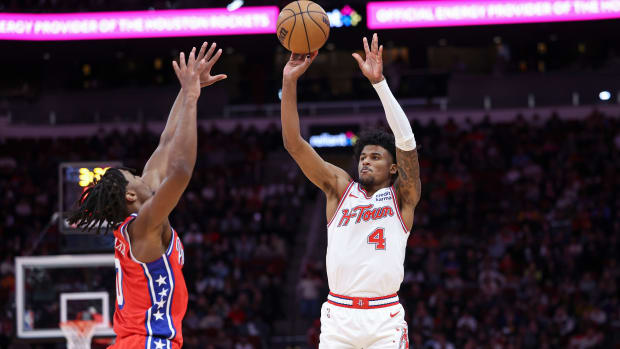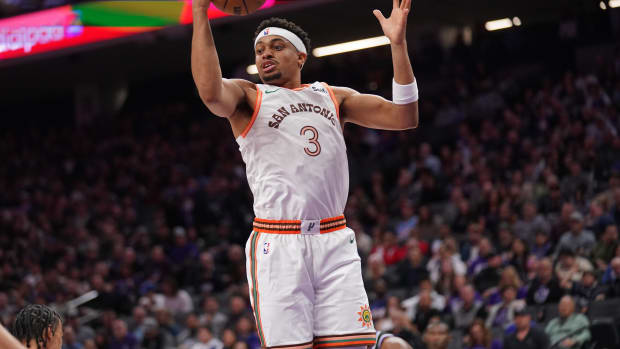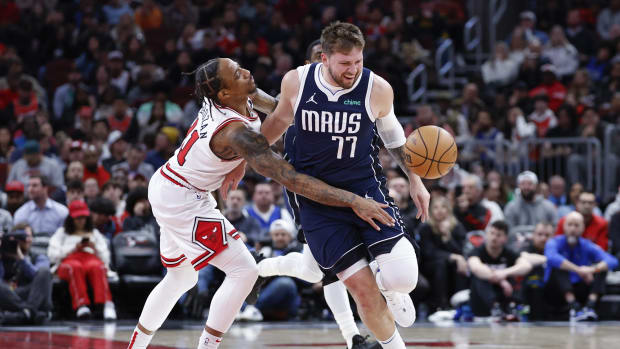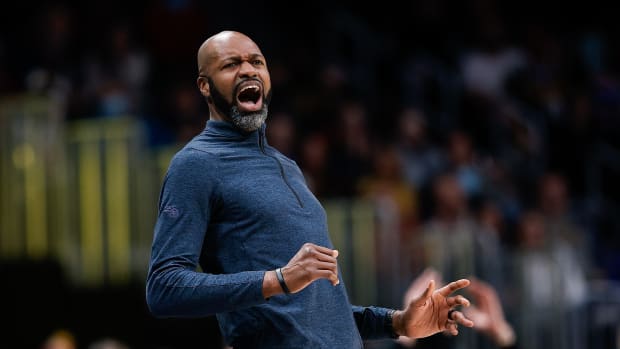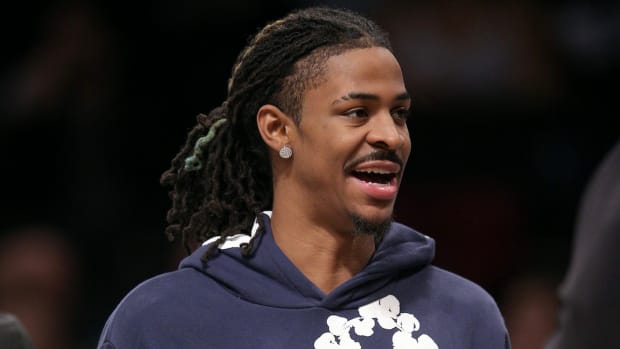NBA playoffs preview: Hawks, Cavs meet in mutual disarray in East finals
Matchup: (1) Atlanta Hawks vs. (2) Cleveland Cavaliers
Season Series: Hawks 3-1
Efficiency Rankings: Atlanta (Off. rating: 6, Def. rating: 7, Net rating: 4)
Cleveland (Off. rating: 4, Def. rating: 20, Net rating: 7)
Playoff Performance: Atlanta beat (8) Brooklyn 4-2 and (5) Washington 4-2; Cleveland beat (7) Boston 4-0 and (3) Chicago 4-2
The Matchup
This year's Eastern Conference finalists are a bit of a mess. Neither team has played anything resembling its best basketball in the playoffs, making their matchup all the more fickle. The Hawks are hardly themselves; the 60-win juggernaut has seen its bench cave in and its fluid offense sputter in the postseason. The Cavs, for their part, are compromised by injury; Kevin Love's absence in these playoffs has forced Cleveland into awkward alternative lineups while Kyrie Irving's ankle sprain has made it all the more difficult to adapt. In all, neither team has been able to execute as a title contender should.
They meet, then, with the intention to refine and endure. These are survivalists. The Hawks and Cavs have made it to this point by eking out just enough points and managing just enough stops to overcome their respective circumstances. Even then, both remain alive in these playoffs by way of natural talent, good fortune, and the grace of the Eastern Conference. Now they find one another, as foils in context, with a place in the Finals to be decided by their respective limitations.
The Case For The Hawks
Broadly, the matchups in this series would seem to favor Atlanta. Al Horford and Paul Millsap are challenging matchups for any of Cleveland's traditional bigs, particularly if the Cavs keep dropping Timofey Mozgov back in coverage of the pick-and-roll. Horford will make even more of those mid-range opportunities than Pau Gasol converted, while Millsap has the perfect off-ball sensibility to capitalize on Tristan Thompson's sometimes overzealous rotations. Those two will swivel around the floor in ways that stretch the Cavs' bigs to their limits. In doing so, they might well force Cleveland into a less comfortable change of its defensive system or a more wholehearted dedication to small lineups.
Sprint to the Finals: Warriors, Rockets poised for track meet in West finals
Either course should work for Jeff Teague, who will be operating against a one-legged opponent to start this series. Irving's defense, when healthy, has never been better. But guarding a roadrunner like Teague in a system like Atlanta's is demanding in ways that won't at all suit an injured guard. Account for the fact that Cleveland has never had the most reliable defensive choreography and it's easy to imagine how Teague sprinting around a screen into a direct line to the rim might create problems.
Cleveland also doesn't have a high-minute rotation player suited to chase Kyle Korver around the floor the way Bradley Beal did (to impressive effect) in the second round. J.R. Smith may try at the start of games, but lacks the clear-minded focus to stay attached to Korver. Iman Shumpert will undoubtedly get his turn, though he tends to fare better defensively when locking in on opponents dribble rather than trailing them around the floor. Matthew Dellavedova will also surely get a crack at Korver, though whether he has the length or playing time to really unsettle Atlanta's sharpshooter remains to be seen.
There will be hiccups in Atlanta's execution, as has been the case in the previous two rounds. Still, the Hawks have enough specific advantages to capitalize—especially when considering the edge of their collective defense. In the regular season, Atlanta stalled some of Cleveland's best actions by trapping out of the pick-and-roll and forcing the ball out of the hands of Irving and LeBron James. That approach is even more brutal now that Irving is limited and Love is out of the series completely—factors that will encourage either forced shots or a pass out to some less capable Cavalier.
James hasn't needed much prodding to isolate this postseason—his one-on-one game has become a central component of Cleveland's offense. Applying pressure to the pick-and-roll game could encourage James to go it alone even more often, entrenching the Cavs in the kind of simple, direct action that's easiest to defend against.
Horford will need to provide great interior help, Millsap may need to defend both big and small, and DeMarre Carroll will have the toughest job of all in containing James on the ball. In total, though, Atlanta has the bones of a defense that could well win this series.
The Case For The Cavaliers
At the risk of being too elementary, it's important to note that the Cavs have the benefit of the NBA's best all-around player. James gives Cleveland a built-in margin for error that Atlanta cannot match. It's there that the contrast between these two rosters is most fascinating; for all the virtue in the Hawks' balance, no single player can get his team out of a jam quite like James.
NBA playoffs preview: Warriors' dream season rolls toward Rockets
That this series looks to be a close one should worry the Hawks, in that sense. James has proven time and again that he can swing possessions in his team's favor when called upon to deliver. His scoring efficiency isn't quite what it was. His defense isn't always as committed as it was during his best years in Miami. Yet James can puzzle through coverages better than any player in the league and sees the game in a way that could turn this series. All it might take is a few possessions at the end of a hard-fought game—the kind that Cleveland and Atlanta seem destined for.
Atlanta might also be pained for defensive options on James beyond Carroll. Millsap could be an option if the Cavs run small, though there's a decided difference between being a quick-footed power forward and a big defender quick enough to keep with James. Beyond that the Hawks will feel the absence of Thabo Sefolosha. Kent Bazemore, the next most likely candidate to defend James in his 40+ minutes, should make Atlanta a bit nervous.
James will need Irving, though, and in that respect it's encouraging to see that the All-Star guard will play in Game 1. Projecting for his recovery gets dicey. Yet Irving found ways to contribute through pain in the previous series and should do so again. At worst, he's a knockdown shooter to station off to the side of a LeBron pick-and-roll. At best, Irving's ankle has already improved to the point of allowing for more movement and might strengthen as the series goes on.
Which remaining bench in conference finals rates as best reserve group?
Though not a deep team, Cleveland can find reassurance in its role players' delivery. Mozgov has done outstanding work in the heart of the Cavs' defense. His rim protection props up the team through miscommunication and error and his work on the glass has sealed those possessions that Cleveland defended successfully. Thompson has come to shape games with his energy, attacking the offensive glass with a ferocity most opponents cannot counter. Between Shumpert, Smith and Dellavedova, the Cavs found a healthy mix of shooting, perimeter defense, and situational shot creation.
Were the Cavs set to face an elite team at the top of its game, its injuries would likely spell its doom. In a series against an opponent whose playoff performance has been as unconvincing as its own, however, Cleveland has the star-driven means to outlast.
The X-factor: Iman Shumpert
Shumpert could spend his series guarding some combination of Korver, Teague, and Dennis Schröder—all of whom need be contained. Korver is the pivotal challenge. If Shumpert isn't able to lock in on Atlanta's top shooter as he curls around screens all over the floor, Cleveland may be drawn to overreaction in its strategy or rotation. If Shumpert does manage to keep Korver under wraps, then the rest of the Hawks' offense will again be left to its own devices. Last that happened, Atlanta barely had enough to outscore Washington.
- MORE NBA: Schedule | Grades | Awards | Playoff coverage | Finals picks
Shumpert is also the player most likely to be left open when the Hawks' defense goes into rotation. Cleveland badly needs him to produce something in those moments, be it points off a catch-and-shoot jumper or a quick dribble move to keep Atlanta on its heels.
Telling stat: 50%
When Horford was on the floor in the second round of the playoffs, Atlanta allowed Washington to shoot just 50% from the restricted area (per NBA.com). To put that figure in perspective: Chicago, the NBA's best interior defense in the regular season, allowed its regular season opponents to shoot 56% from that space.
Horford is a heady defender who, after recovering from years of injuries, is again leveraging his athleticism in defense of the basket. He'll need to turn away James and Irving with the same gusto he's shown of late, not to mention find a second or third bounce to contest Thompson and Mozgov as they work the offensive boards. If Atlanta goes on to win this series, Horford's defensive role will undoubtedly be a crucial reason why.
The Pick
Hawks in six. Atlanta's playoff run leaves plenty of room for doubt. That said, matchup advantages on offense and a collective security on defense should be enough to win a coin-flip series. Irving's health and contributions could potentially swing the series in Cleveland's favor. Yet at the moment it looks as though Cleveland will be forced into uneasy positions on both sides of the ball. How many adjustments do the Cavs—a shallow team already missing one of its best players—really have in them?






























